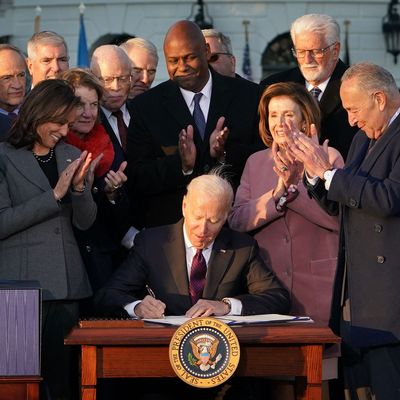
Ten full days after the bipartisan infrastructure bill was cleared by Congress and sent to the White House, President Joe Biden signed it Monday in a carefully planned and timed ceremony. This is Biden’s first big legislative accomplishment in many months, and Democrats suspect the public has tuned it out because of confusion over the bill’s connection to the ongoing negotiations over the Build Back Better package. A staged signing ceremony provides a fresh opportunity for news coverage and a clearer presentation of the bill’s contents, purpose, and significance. Plus the White House hopes tying the legislation more closely to Biden can lift the president’s lagging job-approval ratings.
The ceremony hit the bipartisanship theme early and often, suggesting it’s what the White House thinks it needs politically. The first two members of Congress to speak were centrist Democrat Kyrsten Sinema and Republican Rob Portman (the chief Senate negotiators). Portman offered shout-outs to two great gravediggers of bipartisanship: Mitch McConnell and (yes) Donald J. Trump.
In terms of future expectations, the event was mixed: Portman briefly expressed his opposition to Build Back Better, but Chuck Schumer, Nancy Pelosi, and Kamala Harris touted that yet-to-be-enacted measure as the next big cookie on the plate. While talk of bipartisanship was aimed at swing voters, speakers also expressed plenty of love for the base. Union members were mentioned by every Democratic lawmaker, and a unionized ironworker introduced Biden.
The president echoed those themes before signing the bill, and he made an additional significant announcement: He is appointing former New Orleans mayor (and former Louisiana lieutenant governor) Mitch Landrieu to oversee implementation of the bill. This is a role Biden himself played with respect to President Barack Obama’s stimulus legislation in 2009 and 2010. Landrieu has some special credibility based on his strong record in leading the final recovery of New Orleans from the effects of Hurricane Katrina and other disasters.
This appointment may not be just a token gesture or a nod to the well-regarded Landrieu. The White House is already dealing with reports of slow implementation of the American Rescue Plan stimulus bill and the two rounds of stimulus legislation passed when Trump was president — not to mention predictions Build Back Better will produce an administrative quagmire. It’s important to show due diligence in managing and expediting this next major infusion of federal money, and having an infrastructure czar will help remind voters the work they see around them on construction projects began in Washington.






























